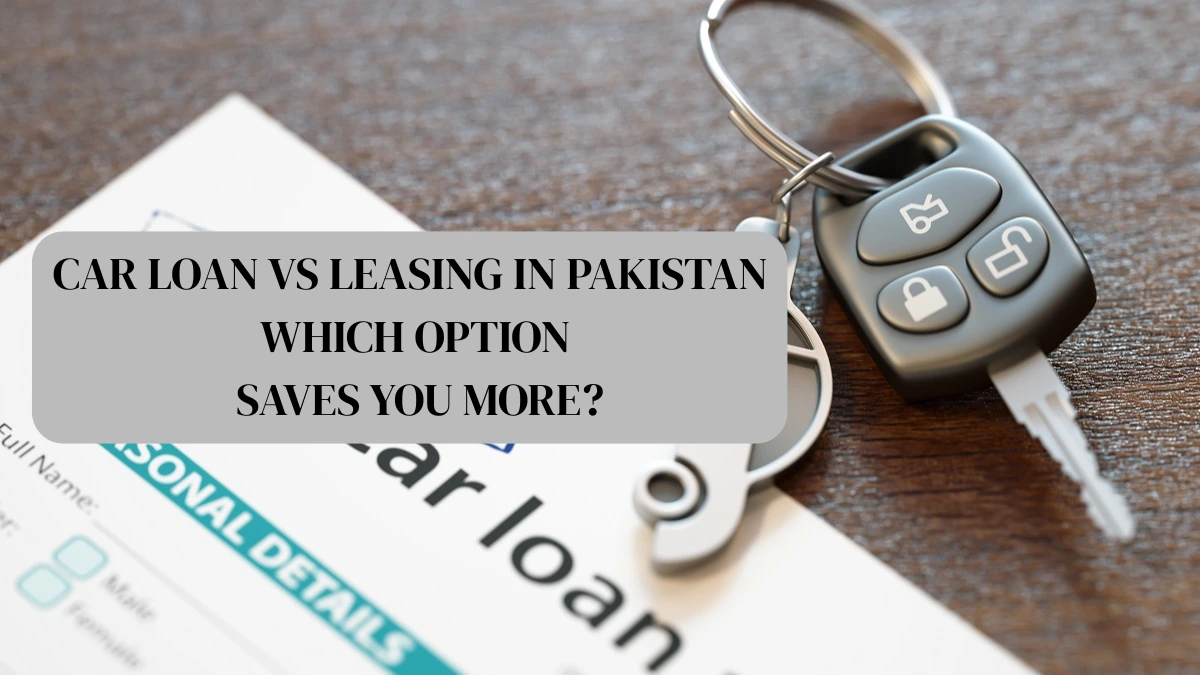Car Loan vs Leasing in Pakistan has grown steadily, driven by rising demand for personal vehicles. However, high interest rates and inflation remain major challenges for buyers.
People typically choose bank loans for full ownership and long-term use, while leasing appeals to those seeking lower monthly payments, newer models, and minimal maintenance responsibilities.
Car Loans in Pakistan: A Complete Guide
Car loans in Pakistan are a popular financing solution for individuals looking to purchase vehicles without paying the full amount upfront. Banks provide the necessary funds while the borrower repays in installments over a set tenure. The purchased vehicle serves as collateral, with the bank holding a lien until the loan is fully repaid.
Key Features of Car Loans
- Ownership: Full ownership is transferred to the borrower after completing all repayments.
- Markup Rates: Banks charge interest, which can be fixed or variable. Many banks link rates to KIBOR, adding a small spread (e.g., MCB Bank offers KIBOR + 2.5%).
- Down Payment: Typically, 30% of the car’s price is required upfront.
- Tenure: Loan periods usually range from 1 to 5 years, depending on the vehicle’s engine capacity and the borrower’s financial profile.
Major Banks Offering Car Loans
| Feature | HBL Car Loan | UBL Drive | Bank Alfalah Auto Loan | MCB Car4U |
|---|---|---|---|---|
| Loan Amount (PKR) | Up to 3,000,000 | 200,000 – 3,000,000 | Up to 3,000,000 | Up to 3,000,000 |
| Financing / Features | Up to 70% of vehicle value; new & used locally assembled; fixed markup; insurance | — | — | — |
| Tenure | Up to 5 years | 1–5 years (≤1000cc); 1–3 years (>1000cc) | 1–5 years | 1–5 years |
| Markup Rates | Fixed | Floating, linked to KIBOR | Fixed or variable | Variable (KIBOR + 2.5%) |
| Eligibility | Salaried individuals with minimum income of 35,000 PKR | Salaried individuals aged 21–60 with minimum income of 35,000 PKR | Salaried individuals with stable income | Salaried individuals with minimum income of 35,000 PKR |
Car loans offer a clear path to vehicle ownership with manageable monthly payments. Borrowers should compare interest rates, tenure options, and eligibility criteria across banks to select the most suitable plan.
Also Read: Harley Davidson Bikes in Pakistan 2025: Prices, Models & Where to Buy
Car Leasing in Pakistan: A Complete Guide
Car leasing in Pakistan is a financial arrangement where a bank or financial institution (the lessor) purchases a vehicle and allows a customer (the lessee) to use it for a fixed period. The lessee makes monthly payments for the use of the car. At the end of the lease term, the vehicle may be returned, purchased, or the lease renewed.
Key Features of Car Leasing
- Ownership: The bank or lessor retains ownership throughout the lease term.
- Monthly Payments: Generally lower than car loan installments, covering only depreciation and rental charges.
- Usage Restrictions: Leases often include mileage limits and restrictions on vehicle modifications.
- Maintenance: Depending on the agreement, maintenance and insurance responsibilities may vary.
Conventional Leasing vs. Islamic Ijarah
| Aspect | Conventional Leasing | Islamic Ijarah |
|---|---|---|
| Ownership | Bank owns the vehicle; lessee rents it | Bank owns the vehicle; lessee rents it |
| Interest | May include interest (Riba) | No interest; fully Shariah-compliant rental structure |
| Shariah Compliance | Often not compliant due to interest | Fully Shariah-compliant under Ijarah principles |
| End of Term Option | Lessee may have option to purchase | Lessee may purchase at token price or return the vehicle |
| Risk & Liability | Bank bears ownership risk; lessee responsible for maintenance | Bank bears ownership risk; lessee responsible for maintenance |
Example: Meezan Bank Car Ijarah
Meezan Bank offers Car Ijarah, Pakistan’s first interest-free vehicle financing product:
- Tenure: 1–5 years
- Ownership: Bank retains ownership during the lease term
- End of Lease: Vehicle may be sold to the customer at a token amount or returned
This structure provides a Shariah-compliant alternative for customers seeking Islamic financing options.
Advantages of Car Leasing
- Lower Monthly Payments: Generally more affordable than car loans.
- Access to New Models: Enables driving newer vehicles more frequently.
- Maintenance Coverage: Some leases include maintenance packages, reducing extra costs.
Limitations of Car Leasing
- No Ownership: Lessee does not automatically own the vehicle at lease end unless a purchase option is exercised.
- Mileage Restrictions: Penalties may apply for exceeding limits.
- Customization Limits: Modifications to the vehicle are often restricted.
Islamic Car Financing Options in Pakistan
Islamic car financing offers Shariah-compliant alternatives to conventional loans, allowing individuals to purchase vehicles without paying interest (Riba). The main structures include Murabaha, Ijarah, and Diminishing Musharakah.
Key Islamic Financing Structures
| Feature | Murabaha | Ijarah | Diminishing Musharakah |
|---|---|---|---|
| How It Works | Bank purchases the vehicle and sells it to the customer at a pre-agreed profit margin | Bank owns the car and leases it to the customer | Bank and customer jointly purchase the vehicle |
| Payments & Ownership | Fixed installments; full ownership transferred immediately | Monthly payments cover usage/rental; option to buy at token price | Customer gradually buys bank’s share while paying rent; full ownership over time |
| Best For | Buyers preferring a straightforward, fixed-cost plan | Customers seeking Shariah-compliant leasing without interest | Buyers who want gradual ownership with rental flexibility |
Example: Meezan Bank Car Ijarah
Meezan Bank offers Car Ijarah, a leading Shariah-compliant car financing product in Pakistan:
- Ownership: Bank retains ownership during the lease term.
- Tenure: 1–5 years.
- End of Lease: The customer can purchase the car at a token price or return it.
- Shariah Compliance: Fully compliant under Islamic principles.
This option is ideal for buyers seeking interest-free, ethical financing with flexible payment structures.
Car Loan vs. Leasing in Pakistan
Choosing between a car loan and leasing in Pakistan requires a clear understanding of costs, ownership, flexibility, and long-term financial impact. Here’s a structured comparison to guide your decision.
Cost & Monthly Installments
- Car Loan: Higher monthly installments (EMIs) compared to leasing. However, payments contribute to full ownership, building long-term value.
- Leasing: Lower monthly payments make it more affordable initially. Over time, the total cost may exceed that of a loan if the vehicle is used beyond the lease term.
Ownership & Flexibility
- Car Loan: Immediate ownership allows full control over the vehicle, including modifications, resale, or trade-in options.
- Leasing: The lessor retains ownership until the end of the lease. Lessees face restrictions on customization and must adhere to lease terms.
Insurance & Additional Charges
- Both car loans and leases require mandatory insurance, which can be either Takaful or conventional, depending on the product.
- Additional costs such as processing fees, security trackers, and other administrative charges may apply. Buyers should factor in these costs to understand the true financial commitment.
Long-Term vs. Short-Term Use
- Car Loan: Best suited for buyers planning to keep the vehicle for 5 years or more, maximizing ownership benefits.
- Leasing: Ideal for those who prefer frequent upgrades, typically every 2–3 years, to access newer models with minimal upfront investment.
Which Banks Provide Car Loan and Leasing in Pakistan?
For individuals looking to finance a vehicle in Pakistan, multiple banks and financial institutions offer car loans, leasing, and Shariah-compliant options. Selecting the right provider depends on cost, tenure flexibility, and compliance preferences.
Top Banks Offering Car Loans
- HBL (Habib Bank Limited): Conventional car loans with flexible tenure and high approval rates.
- UBL (United Bank Limited): Personal and auto financing with competitive markup rates.
- Bank Alfalah: Quick processing, offering both conventional and Islamic options.
- MCB (Muslim Commercial Bank): Affordable EMIs covering multiple car models.
- Meezan Bank: Shariah-compliant plans including Ijarah and Diminishing Musharakah.
- Askari Bank & Faysal Bank: Smaller banks providing niche car loan solutions.
Banks Offering Car Leasing Options
- Meezan Bank Ijarah: Islamic leasing with a token purchase option at lease end.
- UBL & Bank Alfalah Leasing: Conventional leasing, oftenincluding maintenance packages.
- Habib Leasing & Finance Companies: Available for corporate and individual clients.
- PakLease & Pak Brunei Leasing: Private leasing firms approved by the SBP.
Comparison Table – Banks, Loan, and Leasing Options
| Bank / Institution | Car Loan | Leasing | Islamic Option | Key Feature |
|---|---|---|---|---|
| HBL | ✅ | ✅ | ❌ | Flexible EMI, easy approval |
| UBL | ✅ | ✅ | ❌ | Competitive markup |
| Bank Alfalah | ✅ | ✅ | ✅ | Quick processing, Shariah option |
| Meezan Bank | ✅ | ✅ | ✅ | Halal financing, Ijarah available |
| MCB | ✅ | ❌ | ❌ | Affordable EMI |
| PakLease | ❌ | ✅ | ❌ | Leasing for individuals & corporates |
Pros and Cons of Car Financing Options in Pakistan
When choosing between a bank loan, leasing, or Islamic car financing, understanding the advantages, limitations, and ideal use cases can help make an informed decision.
| Financing Option | Advantages | Disadvantages | Ideal For |
|---|---|---|---|
| Bank Loan | Full ownership from day one, flexibility to modify or sell, retains resale value | Higher monthly installments (EMIs), markup/interest rates | Long-term car users planning to keep the vehicle for 5+ years |
| Leasing | Lower monthly payments, access to newer car models more frequently | Usage restrictions, limited customization, potentially higher total cost | Short-term users who prefer frequent upgrades |
| Islamic Finance | Shariah-compliant, transparent, interest-free financing, ethical | Limited availability, profit rates may vary | Buyers seeking Shariah-compliant, ethical financing solutions |
Market Trends in 2025 – Car Financing in Pakistan
The automotive financing landscape in Pakistan is evolving rapidly in 2025, driven by economic conditions, consumer preferences, and regulatory changes. Understanding these trends can help buyers and investors make informed decisions.
Decline in Auto Financing Due to High Interest Rates
Despite recent reductions in the State Bank of Pakistan (SBP) policy rate—from 22% in June 2024 to 11% in May 2025—auto financing has seen a slowdown.
- Outstanding Car Loans: Decreased from PKR 368 billion in June 2022 to PKR 128 billion by the end of 2023.
- Key Factors: High vehicle prices, increased monthly installments, and limited consumer purchasing power.
This decline highlights the sensitivity of auto financing to interest rates and affordability.
Growing Demand for Islamic Financing & Leasing
Islamic finance continues to gain popularity in Pakistan as consumers seek Shariah-compliant, ethical financing options.
- Islamic Banking Assets: Surpassed PKR 8.6 trillion by mid-2024, with deposits exceeding PKR 6 trillion.
- Drivers: Regulatory support, ethical considerations, and interest-free financing options.
Shariah-compliant products such as Ijarah and Diminishing Musharakah are becoming increasingly preferred for vehicle financing.
Shift Towards Small Cars & Electric Vehicles (EVs)
Consumer preferences in 2025 show a clear move towards smaller, more affordable cars and electric vehicles (EVs).
- Reasons: Lower cost, higher fuel efficiency, and environmental awareness.
- Government Initiatives: Subsidies and green auto-financing reforms are encouraging EV adoption.
This trend reflects a growing interest in sustainable mobility solutions and budget-friendly vehicles.
Key Takeaways
- High interest rates have temporarily slowed conventional auto financing.
- Islamic finance and leasing are increasingly popular due to ethical and financial benefits.
- Small cars and EVs dominate consumer demand, supported by government incentives and evolving market preferences.
References & Further Reading:



